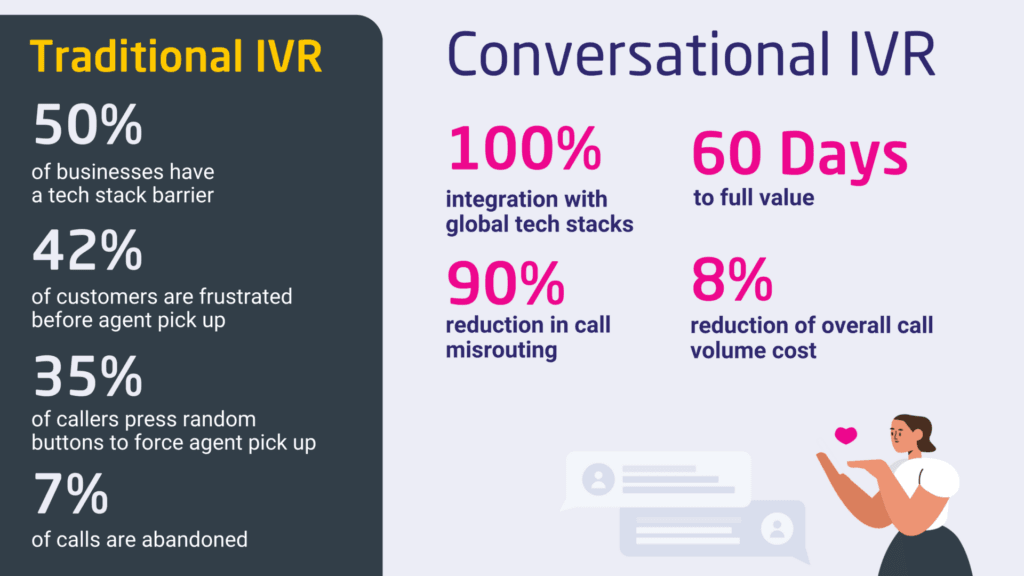Interactive Voice Response (IVR) systems are becoming increasingly popular in the customer service industry. Furthermore, they allow customers to interact with a computerized system and access the information they need, often without having to speak to a live agent.
Traditional IVR systems use touch-tone or speech recognition technology to identify and route callers.
However, conversational IVR, which uses natural language, is becoming more popular due to its ability to mimic human conversation and provide a significantly improved level of care.
What Are Some of the Top Benefits of IVR?
Here are seven benefits of IVR, especially conversational IVR, for customer service:
Improved Customer Experience
A conversational IVR system can provide customers with a personalized experience. It uses Natural Language technology to understand customer inquiries and provides them with the most relevant information.
This improves the customer experience as customers can quickly and easily find the information they need, without having to navigate a complicated menu system. A study by Capgemini found that conversational AI technology can improve the overall customer experience by up to 20%.
Reduced Wait Times
Traditional IVR systems can be frustrating for customers, as they often have to navigate a long menu before speaking to a live agent. A conversational IVR system, however, can quickly identify the customer’s needs and route them to the most appropriate agent, reducing wait times. A report by Contact Babel found that conversational IVR systems can reduce call handling times by up to 30%.
Increased Efficiency
A conversational IVR system can quickly identify the customer’s needs and provide them with the information they need. This reduces the amount of time agents spend on the phone and increases their efficiency. The same Contact Babel report found that conversational IVR systems can increase agent productivity by up to 15%.
Cost Savings
A conversational IVR system can reduce the number of calls that require human intervention, reducing staffing costs. Additionally, customers are more likely to find the information they need, reducing the need for follow-up calls and saving the company money.

Improved Data Collection
A conversational IVR system can collect data on customer inquiries, allowing companies to identify trends and improve their service offerings. This data can be used to identify areas where customer service can be improved and to create a more personalized experience for customers.
According to Grand View Research, the global conversational AI market is expected to reach $41 billion by 2030, driven by the growing demand for data analytics and the key factors influencing the growth of the market are rising demand, reduced chatbot development costs, AI-powered customer support services, and omnichannel deployment
Scalability
A conversational IVR system can handle a large volume of calls, allowing companies to scale their customer service operations as their business grows. Additionally, it can handle multiple inquiries simultaneously, reducing wait times and increasing customer satisfaction. Add in Swisscom and Telefonica here.
24/7 Availability
A conversational IVR system can provide customers with access to information and support 24/7. This is especially useful for customers who need information outside of regular business hours or who are in different time zones.
As customer expectations continue to evolve, companies that invest in conversational IVR systems will be well-positioned to provide the personalized, efficient service that customers demand, ensuring they enjoy the full benefits of IVR systems.
Subscribe to Our Newsletter
Continue Reading:
FAQs
What are the 7 key benefits of IVR systems for modern businesses?
The 7 key benefits include: 1) 24/7 customer service availability 2) Reduced operational costs through automation 3) Improved call routing efficiency (+99% accuracy), 4) Enhanced customer self-service capabilities (60% full call containment), 5) Decreased wait times (from 13 minutes to under 20 seconds), 6) Better resource utilization and 7) Comprehensive call analytics and insights for continuous improvement.
Discover Agentic AI: Download our Agentic AI guide to understand how Agentic AI drive business value in IVRs.
How do IVR systems reduce operational costs while improving customer experience?
IVR systems reduce costs by automating routine inquiries (handling 70-80% of calls), enabling efficient call routing (reducing misdirected calls by 90%), reducing agent workload (allowing focus on complex issues), minimizing abandoned calls, and providing self-service options. Simultaneously, they improve experience through faster resolution, personalized interactions, and consistent service quality (100% consistency vs. human variation).
What makes modern conversational IVR more effective than traditional menu based systems?
Modern conversational IVR uses natural language processing (industry leading 99% accuracy with Teneo), understands customer intent immediately (eliminating 5-7 menu levels), provides personalized responses based on customer history, learns from interactions to improve performance, offers seamless escalation, and creates more human-like conversations that significantly improve customer satisfaction by 50-70% and task completion rates by 60-80%.
How can businesses measure the ROI of IVR implementation?
ROI can be measured through reduced operational costs, improved first contact resolution rates, decreased average handle time, increased customer satisfaction scores, reduced agent turnover, higher self-service success rates, and overall improvement in customer experience metrics. These are all usually falling under the umbrella term total cost of ownership. Typical ROI is achieved within 8-12 months.


